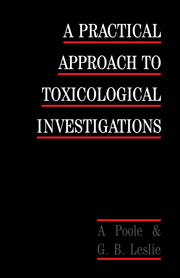Book contents
- Frontmatter
- Contents
- Foreword
- Preface
- List of abbreviations
- 1 Introduction
- 2 Regulatory requirements
- 3 Animals: sources, selection, husbandry
- 4 Standard studies in animals
- 5 Measurements and observations made in living animals
- 6 Terminal studies
- 7 Specialised routes of exposure
- 8 Reproductive toxicology
- 9 Genotoxicity
- Appendix 1 Toxicology data requirements for clinical trial approval and registration of new drugs
- Appendix 2 Countries and addresses of regulatory agencies
- Index
Foreword
Published online by Cambridge University Press: 04 August 2010
- Frontmatter
- Contents
- Foreword
- Preface
- List of abbreviations
- 1 Introduction
- 2 Regulatory requirements
- 3 Animals: sources, selection, husbandry
- 4 Standard studies in animals
- 5 Measurements and observations made in living animals
- 6 Terminal studies
- 7 Specialised routes of exposure
- 8 Reproductive toxicology
- 9 Genotoxicity
- Appendix 1 Toxicology data requirements for clinical trial approval and registration of new drugs
- Appendix 2 Countries and addresses of regulatory agencies
- Index
Summary
It is a fact of life that the disciplines of greatest current importance are the least well represented in terms of university chairs and departments. Toxicology falls into this category. A consequence is that toxicology is a melting pot for scientists coming from a wide range of more established disciplines including chemistry, physics, statistics, biochemistry, biology, zoology, physiology, pharmacology, molecular biology, pathology, haematology, veterinary medicine, human medicine, the behavioural sciences, etc. Where groups of erudite scientists coming from these many disciplines converge on a problem they can, between them, if they get their act together, achieve great heights and be seen to be on the frontiers of science. However, before they can easily and meaningfully work together, they have to share a common understanding of the current state of the art and of what the general public and regulatory authorities expect of them, and there is a special jargon which they need to master. Unless a would-be toxicologist knows instantly what abbreviations such as QA, NOEL, OECD, GLP and many others mean, he will be at a disadvantage when it comes to understanding what, why, and the way in which toxicological studies are conducted. In this context, the list of frequently used abbreviations (p. xiii) will be much appreciated.
The aim of this book is to help scientists coming from other disciplines into the melting pot of toxicology to acquire as quickly as possible the basic information which everyone needs to have to function efficiently and effectively in the field.
- Type
- Chapter
- Information
- A Practical Approach to Toxicological Investigations , pp. ix - xPublisher: Cambridge University PressPrint publication year: 1989



